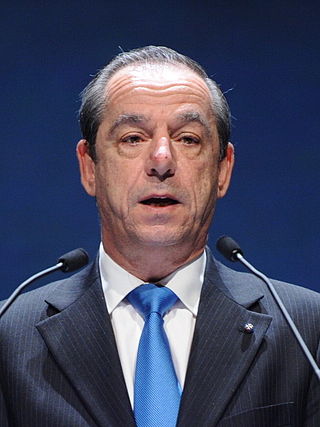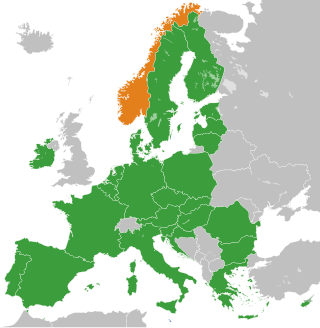
Euroscepticism, also spelled as Euroskepticism or EU-scepticism, is a political position involving criticism of the European Union (EU) and European integration. It ranges from those who oppose some EU institutions and policies and seek reform, to those who oppose EU membership and see the EU as unreformable. The opposite of Euroscepticism is known as pro-Europeanism.

The politics of Malta takes place within a framework of a parliamentary representative democratic republic, whereby the president of Malta is the constitutional head of state. Executive authority is vested in the president of Malta, with the general direction and control of the Government of Malta remaining with the prime minister of Malta, who is the head of government and the cabinet. Legislative power is vested in the Parliament of Malta, which consists of the president of Malta and the unicameral House of Representatives of Malta with the speaker as the presiding officer of the legislative body. Judicial power remains with the chief justice and the judiciary of Malta. Since independence, the party electoral system has been dominated by the Christian democratic Nationalist Party and the social democratic Labour Party.

The Nationalist Party is one of the two major contemporary political parties in Malta, along with the Labour Party.

The European Union (EU) has expanded a number of times throughout its history by way of the accession of new member states to the Union. To join the EU, a state needs to fulfil economic and political conditions called the Copenhagen criteria, which require a stable democratic government that respects the rule of law, and its corresponding freedoms and institutions. According to the Maastricht Treaty, each current member state and the European Parliament must agree to any enlargement. The process of enlargement is sometimes referred to as European integration. This term is also used to refer to the intensification of co-operation between EU member states as national governments allow for the gradual harmonisation of national laws.

Edoardo "Eddie" Fenech Adami is a Maltese politician and Nationalist politician who served as the prime minister of Malta from 1987 until 1996, and again from 1998 until 2004. Subsequently, he was the seventh president of Malta from 2004 to 2009. He led his party to win four general elections, in 1987, 1992, 1998 and 2003, as well as the majority of votes in 1981. Staunchly pro-European, Fenech Adami was fundamental for Malta's accession to the European Union.

The Labour Party, formerly known as the Malta Labour Party, is one of the two major political parties in Malta, along with the Nationalist Party. It sits on the centre-left of the political spectrum.

Lawrence Gonzi is a Maltese politician, retired Nationalist politician and lawyer, who served for twenty-five years in various critical roles in Maltese politics. Gonzi was Prime Minister of Malta from 2004 to 2013, and leader of the Nationalist Party. He also served as speaker of the House from 1988 to 1996, and Minister of Social Policy from 1998 to 2004, as well as deputy prime minister from 1999 to 2004. He served in practically all positions in Parliament, being also Leader of the House, an MP and Leader of the Opposition.

This is a list of referendums related to the European Union, or referendums related to the European Communities, which were predecessors of the European Union. Since 1972, a total of 48 referendums have been held by EU member states, candidate states, and their territories, with several additional referendums held in countries outside the EU. The referendums have been held most commonly on the subject of whether to become a member of European Union as part of the accession process, although the EU does not require any candidate country to hold a referendum to approve membership or as part of treaty ratification. Other EU-related referendums have been held on the adoption of the euro and on participation in other EU-related policies.

Alfred Sant, is a Maltese politician and a novelist. He led the Labour Party from 1992 to 2008 and served as Prime Minister of Malta between 1996 and 1998 and as Leader of the Opposition from 1992 to 1996 and from 1998 to 2008. Sant is an established writer and playwright and has published several books.

For Fatherland and Freedom/LNNK was a free-market, national conservative political party in Latvia. In 2011, it dissolved and merged into the National Alliance.

Joseph Muscat is a Maltese politician who served as the 13th prime minister of Malta from 2013 to 2020 and leader of the Labour Party from 2008 to 2020.

Democratic Alternative, sometimes referred to as AD – The Green Party, was a green political party in Malta. The party was initially founded by a coalition of former Labour Party members and environmental activists in 1989. On 1 August 2020 the party announced a plan to merge with the Democratic Party to form a new party called AD+PD. The merger was conducted on 17 October 2020.

Euroscepticism in the United Kingdom is a continuum of belief ranging from the opposition to certain political policies of the European Union to the complete opposition to the United Kingdom’s membership of the European Union. It has been a significant element in the politics of the United Kingdom (UK). A 2009 Eurobarometer survey of EU citizens showed support for membership of the EU was lowest in the United Kingdom, alongside Latvia and Hungary.

Norway is not a member state of the European Union (EU). However, it is associated with the Union through its membership in the European Economic Area (EEA), signed in 1992 and established in 1994. Norway was a founding member of the European Free Trade Association (EFTA) in 1960, which was originally set up as an alternative to the European Economic Community (EEC), the main predecessor of the EU. Norway had considered joining both the EEC and the European Union, but opted to decline following referendums in 1972 and 1994. According to the European Social Survey conducted in 2018, 73.6% of Norwegians would vote 'No' in a referendum to join the European Union. Norway shares land borders with two EU member states, namely Finland and Sweden, and maritime borders with a third, Denmark.
A referendum on joining the European Union was held in Hungary on 12 April 2003. The proposal was approved by 83.8% of voters, with a voter turnout of 45.6%. Hungary subsequently joined the EU on 1 May 2004.

There are currently nine states recognized as candidates for membership of the European Union: Albania, Bosnia and Herzegovina, Georgia, Moldova, Montenegro, North Macedonia, Serbia, Turkey, and Ukraine. Kosovo formally submitted its application for membership in 2022 and is considered a potential candidate by the European Union. Due to multiple factors, talks with Turkey are at an effective standstill since December 2016.

The largest enlargement of the European Union (EU), in terms of number of states and population, took place on 1 May 2004.

The history of the European Union from 2004 to the present is the current timeline of the European Union. It is a period of significant upheaval and reform following the 2004 enlargement of the European Union. The EU has taken on ten new members, eight of which were initially much poorer than the EU average, and took in a further two in 2007 with many more on the way. It created the euro a few years before and had to expand this, and the Schengen Area to its new members. However this was overshadowed by the late-2000s recession and damaging disputes over the European Constitution and its successor, the Treaty of Lisbon. Throughout this period, the European People's Party has been the largest group in the European Parliament and provides every President of the European Commission.

The Treaty of Accession 1972 was the international agreement which provided for the accession of Denmark, Ireland, Norway and the United Kingdom to the European Communities. Norway did not ratify the treaty after it was rejected in a referendum held in September 1972. The treaty was ratified by Denmark, Ireland and the United Kingdom who became EC member states on 1 January 1973 when the treaty entered into force. The treaty remains an integral part of the constitutional basis of the European Union.

Malta and the North Atlantic Treaty Organization (NATO) have a close relationship. Malta is one of four members of the European Union that are not members of NATO, the others being Austria, Cyprus and Ireland. Malta has had formal relations with NATO since 1995, when it joined the Partnership for Peace programme. While it withdrew in 1996, it rejoined as a member in 2008.
















